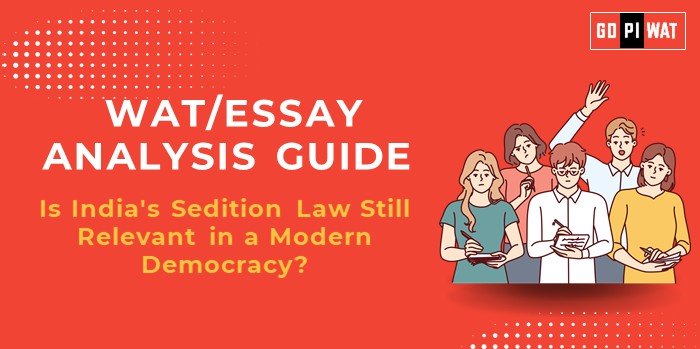📋 GD Analysis Guide: Is India’s Sedition Law Still Relevant in a Modern Democracy?
🌐 Introduction to the Topic
- ⚖️ Opening Context: The sedition law in India, codified under Section 124A of the Indian Penal Code, has been a focal point of legal and public discourse. Originally designed to suppress dissent during colonial rule, its relevance in today’s democratic context is hotly debated.
- 📜 Topic Background: Drafted in 1870 by the British, the sedition law aimed to curb resistance against the colonial government. Post-independence, its role has evolved amidst concerns over misuse and its impact on freedom of speech. Recent Supreme Court reviews have rekindled discussions about its necessity in a democracy.
📊 Quick Facts and Key Statistics
- 📅 Introduced in: 1870 during British rule, retained post-1947.
- ⚖️ Current Provisions: Punishments range from a fine to life imprisonment.
- 📉 Conviction Rates: Less than 4% of sedition cases from 2010-2020 resulted in convictions (NCRB 2023).
- ⚖️ Supreme Court Review: In 2022, the Court put the law on hold, urging the government to revisit its relevance.
👥 Stakeholders and Their Roles
- 🏛️ Government: Ensures national security but is often accused of overreach in invoking the law.
- ⚖️ Judiciary: Balances enforcement with constitutional safeguards, like Article 19(1)(a) (freedom of speech).
- 📢 Citizens and Activists: Advocate for its repeal to protect democratic values.
- 📰 Media: Plays a critical role in highlighting cases of alleged misuse.
🏆 Achievements and Challenges
✨ Achievements:
- ⚖️ Deterrence Against Anti-State Activities: Used against insurgencies in sensitive areas.
- 🛡️ National Security: Historically helped curb movements against the sovereignty of the state.
⚠️ Challenges:
- 📉 Misuse and Overreach: Multiple cases filed for dissenting opinions or criticisms of the government.
- 🔒 Freedom of Speech Concerns: Inconsistent with democratic principles of open criticism.
- 🌍 Global Comparisons: Democracies like the UK repealed similar laws in 2009, questioning India’s need to retain it.
📖 Case Study:
The arrest of journalists and activists under sedition laws has drawn significant public and judicial scrutiny, as seen in the 2021 Manipur journalist case.
🗣️ Structured Arguments for Discussion
- ✅ Supporting Stance: “In a nation with diverse and often conflicting interests, sedition laws serve as a necessary safeguard against divisive elements.”
- ❌ Opposing Stance: “The sedition law stifles democratic dissent, curbing the essential right to free speech guaranteed by the Constitution.”
- ⚖️ Balanced Perspective: “While the sedition law can be a tool for maintaining national security, its misuse undermines democratic freedoms, necessitating reforms or alternatives.”
💡 Effective Discussion Approaches
✨ Opening Approaches:
- 📜 “Introduced by the British, does this colonial relic align with modern democratic ideals?”
- 📉 “With a conviction rate below 4%, does the sedition law achieve its intended purpose?”
🔄 Counter-Argument Handling:
- 🌍 Reference global examples (e.g., UK’s repeal of sedition laws).
- ⚖️ Cite judicial interventions emphasizing the need for proportionality and restraint.
⚡ Strategic Analysis of Strengths and Weaknesses
- 💪 Strengths: Protects national unity, curbs insurgencies.
- 🚫 Weaknesses: Misuse against dissenters, low conviction rate.
- 🚀 Opportunities: Reform the law for targeted application.
- ⚠️ Threats: Risk of alienating citizens, international criticism.
📚 Connecting with B-School Applications
- 🏢 Real-World Applications: Analyzing governance models, legal reforms, and balancing civil liberties with state security.
- 🤔 Sample Interview Questions:
- 📜 “What are the implications of retaining colonial-era laws in modern India?”
- 📚 “How does freedom of speech contribute to a nation’s development?”
- 💡 Insights for Students: Explore case studies on law and policy reforms, and debate the role of media in safeguarding democracy.


